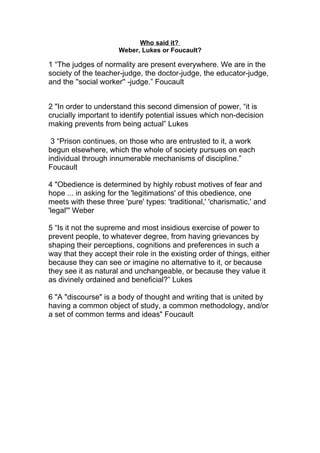Who Said It? Foucault, Weber or Lukes
•Download as DOC, PDF•
0 likes•27 views
This document contains 6 quotes, 3 by Foucault discussing the role of judges in society and the continuation of discipline within prisons. 2 quotes are by Lukes discussing the prevention of issues through non-decision making and shaping perceptions to accept existing power structures. The final quote is by Weber describing the 3 pure types of obedience as traditional, charismatic, and legal.
Report
Share
Report
Share

Recommended
More Related Content
Similar to Who Said It? Foucault, Weber or Lukes
Similar to Who Said It? Foucault, Weber or Lukes (9)
lecture_3_deconstructing_experience_and_biopower_2018_19.pptx

lecture_3_deconstructing_experience_and_biopower_2018_19.pptx
Module 3 The Individual in Postmodern SocietyDiscussion Questio.docx

Module 3 The Individual in Postmodern SocietyDiscussion Questio.docx
More from sociologyexchange.co.uk
More from sociologyexchange.co.uk (20)
Who Said It? Foucault, Weber or Lukes
- 1. Who said it? Weber, Lukes or Foucault? 1 “The judges of normality are present everywhere. We are in the society of the teacher-judge, the doctor-judge, the educator-judge, and the ''social worker'' -judge.” Foucault 2 "In order to understand this second dimension of power, “it is crucially important to identify potential issues which non-decision making prevents from being actual” Lukes 3 “Prison continues, on those who are entrusted to it, a work begun elsewhere, which the whole of society pursues on each individual through innumerable mechanisms of discipline.” Foucault 4 "Obedience is determined by highly robust motives of fear and hope ... in asking for the 'legitimations' of this obedience, one meets with these three 'pure' types: 'traditional,' 'charismatic,' and 'legal'" Weber 5 “Is it not the supreme and most insidious exercise of power to prevent people, to whatever degree, from having grievances by shaping their perceptions, cognitions and preferences in such a way that they accept their role in the existing order of things, either because they can see or imagine no alternative to it, or because they see it as natural and unchangeable, or because they value it as divinely ordained and beneficial?” Lukes 6 "A "discourse" is a body of thought and writing that is united by having a common object of study, a common methodology, and/or a set of common terms and ideas" Foucault